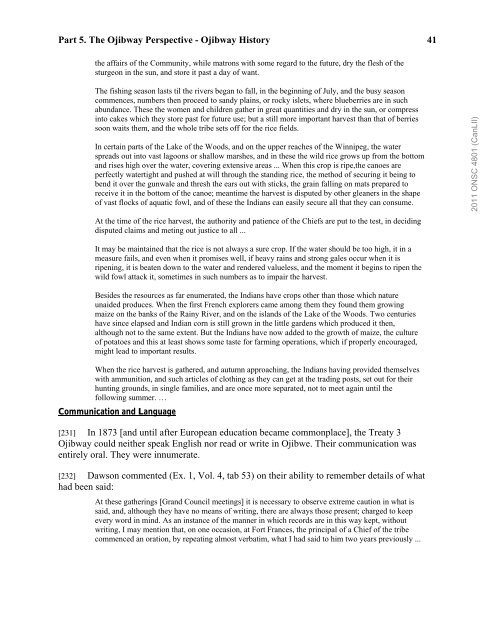Keewatin v. Minister of Natural Resources
Keewatin v. Minister of Natural Resources
Keewatin v. Minister of Natural Resources
- No tags were found...
You also want an ePaper? Increase the reach of your titles
YUMPU automatically turns print PDFs into web optimized ePapers that Google loves.
Part 5. The Ojibway Perspective - Ojibway History 41the affairs <strong>of</strong> the Community, while matrons with some regard to the future, dry the flesh <strong>of</strong> thesturgeon in the sun, and store it past a day <strong>of</strong> want.The fishing season lasts til the rivers began to fall, in the beginning <strong>of</strong> July, and the busy seasoncommences, numbers then proceed to sandy plains, or rocky islets, where blueberries are in suchabundance. These the women and children gather in great quantities and dry in the sun, or compressinto cakes which they store past for future use; but a still more important harvest than that <strong>of</strong> berriessoon waits them, and the whole tribe sets <strong>of</strong>f for the rice fields.In certain parts <strong>of</strong> the Lake <strong>of</strong> the Woods, and on the upper reaches <strong>of</strong> the Winnipeg, the waterspreads out into vast lagoons or shallow marshes, and in these the wild rice grows up from the bottomand rises high over the water, covering extensive areas ... When this crop is ripe,the canoes areperfectly watertight and pushed at will through the standing rice, the method <strong>of</strong> securing it being tobend it over the gunwale and thresh the ears out with sticks, the grain falling on mats prepared toreceive it in the bottom <strong>of</strong> the canoe; meantime the harvest is disputed by other gleaners in the shape<strong>of</strong> vast flocks <strong>of</strong> aquatic fowl, and <strong>of</strong> these the Indians can easily secure all that they can consume.At the time <strong>of</strong> the rice harvest, the authority and patience <strong>of</strong> the Chiefs are put to the test, in decidingdisputed claims and meting out justice to all ...2011 ONSC 4801 (CanLII)It may be maintained that the rice is not always a sure crop. If the water should be too high, it in ameasure fails, and even when it promises well, if heavy rains and strong gales occur when it isripening, it is beaten down to the water and rendered valueless, and the moment it begins to ripen thewild fowl attack it, sometimes in such numbers as to impair the harvest.Besides the resources as far enumerated, the Indians have crops other than those which natureunaided produces. When the first French explorers came among them they found them growingmaize on the banks <strong>of</strong> the Rainy River, and on the islands <strong>of</strong> the Lake <strong>of</strong> the Woods. Two centurieshave since elapsed and Indian corn is still grown in the little gardens which produced it then,although not to the same extent. But the Indians have now added to the growth <strong>of</strong> maize, the culture<strong>of</strong> potatoes and this at least shows some taste for farming operations, which if properly encouraged,might lead to important results.When the rice harvest is gathered, and autumn approaching, the Indians having provided themselveswith ammunition, and such articles <strong>of</strong> clothing as they can get at the trading posts, set out for theirhunting grounds, in single families, and are once more separated, not to meet again until thefollowing summer. …Communication and Language[231] In 1873 [and until after European education became commonplace], the Treaty 3Ojibway could neither speak English nor read or write in Ojibwe. Their communication wasentirely oral. They were innumerate.[232] Dawson commented (Ex. 1, Vol. 4, tab 53) on their ability to remember details <strong>of</strong> whathad been said:At these gatherings [Grand Council meetings] it is necessary to observe extreme caution in what issaid, and, although they have no means <strong>of</strong> writing, there are always those present; charged to keepevery word in mind. As an instance <strong>of</strong> the manner in which records are in this way kept, withoutwriting, I may mention that, on one occasion, at Fort Frances, the principal <strong>of</strong> a Chief <strong>of</strong> the tribecommenced an oration, by repeating almost verbatim, what I had said to him two years previously ...
















